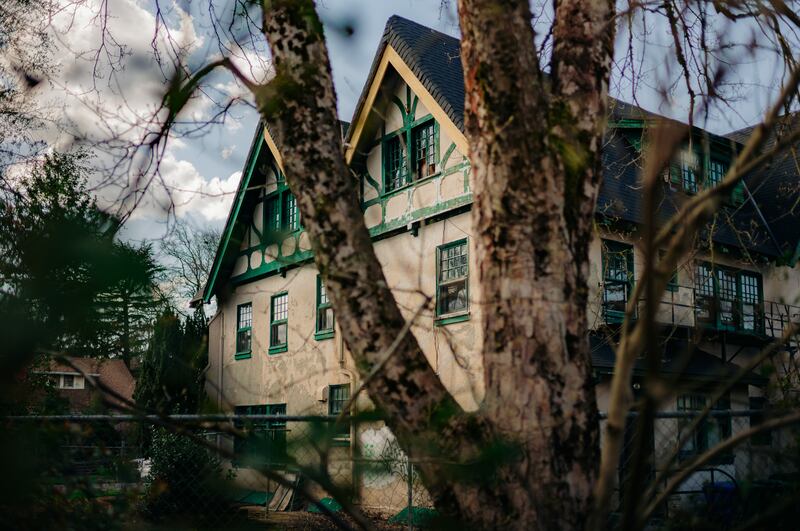ADDRESS: 5128 NE Rodney Ave.
YEAR BUILT: 1912
SQUARE FOOTAGE: 5,500
MARKET VALUE: $1.22 million
OWNER: Ocobock Mansion LLC
HOW LONG IT’S BEEN EMPTY: 8 years
WHY IT’S EMPTY: Renovation costs following a nonprofit’s collapse.
There are few vacant properties in the King neighborhood, where gentrification has brought extraordinary inflation as homebuyers have vacuumed up vintage homes near amenities along Northeast Alberta Street and North Mississippi Avenue.
But one of the most storied homes in the neighborhood has stood empty since at least 2015, when the corrupt executive director of a nonprofit operating there lost the property to receivership.
“There seems to be activity there sometimes but no progress,” says Kevin Kelly, who has owned an adjacent home since 2003. “Nobody seems to know what’s going on—it’s puzzling.”
The three-story, six-bedroom Tudor-style home at 5128 NE Rodney Ave. boasts quite a pedigree. Charles Ertz, the noted architect behind the Laurelhurst Theater, Jantzen Estate (which stands on a 5-acre island in Lake Oswego) and many other historic buildings, according to Portland’s Architectural Heritage Center, designed it for A.W. Ocobock, who financed significant development in East Portland.
To understand why Ocobock Mansion sits empty today, however, it’s helpful to go back to a different Portland.
In the 1960s, Highland United Church of Christ owned the home. The church and the home occupied a central place in Portland’s Black community, then concentrated in inner North and Northeast Portland.
But gentrification changed the neighborhood’s demographics and, in 1995, the church sold the house for $60,000 to Multnomah County. The following year, the county gave the property to a social services nonprofit called Give Us This Day.
Give Us This Day, run by Mary Holden Ayala, served Black foster children with funding from the state. The government contracts were lucrative, and state and federal investigators would later determine that Ayala diverted much of the money for her own use—luxury shopping, resort travel, and improvements to her own home.
By 2015, Ocobock Mansion had descended into squalor. Utilities shut off service; fire inspectors found the home unsafe; and, according to employees, the girls Ayala was paid handsomely to care for often lacked basic hygiene items—and food.
After a WW cover story (“Home Sweet Hustle,” Sept. 15, 2015), the Oregon Department of Justice appointed a receiver to liquidate Give Us This Day.
That’s when things got weird.

The stately, albeit decrepit, mansion flipped like an Olympic high diver: On April 22, 2016, the receiver sold the mansion to Wilde Properties for $570,000; less than two weeks later, Wilde sold it to Everett Custom Homes for $900,000.
Neighbors and leaders in Portland’s Black community feared Everett would demolish the mansion to redevelop the large lot. (The mansion sits on a 12,500-square-foot piece of land, two and a half times the size of a standard city lot.) They rushed to save it. A new entity they formed, Ocobock Mansion LLC, bought the property on Aug. 15, 2016, for $1.1. million.
That meant that in less than four months, the price increased $530,000—a 93% jump.
“Somebody made a bunch of money,” says Jeff Moreland, co-founder of Raimore Construction, one of the city’s largest Black contractors and a leader of the group that rallied to buy the home. “It was egregious what happened.”
Moreland says scraping the money together was difficult—Ocobock Mansion LLC relied on $700,000 from a hard money lender to make the purchase. The LLC retired that loan in 2017, records show, but Moreland says the steep purchase price and high interest consumed much of his group’s renovation budget.
While Ocobock Mansion’s new owners moved slowly to make the property new again, things went in a different direction for Give Us This Day’s Mary Ayala.
In 2019, after an eight-day trial in U.S. District Court in Portland, a jury found her guilty on felony counts including theft and filing false tax returns. “Stealing from vulnerable children she was entrusted to serve with taxpayer money is a despicable act and warrants severe consequences,” said then-U.S. Attorney for Oregon Billy Williams.
Ayala was sentenced to 33 months in prison. Records show she was released Dec. 6, 2021, but remains under post-prison supervision.

Moreland says that bad karma is in the past. A wire construction fence still surrounds the property, but Moreland’s group has shored up the interior and added a new roof. He’s not quite sure when renovations will be finished, but he says he’s not trying to make a profit.
“What I would love to be able to do is turn it into a community asset that generates enough revenue to take care of itself,” Moreland says. “We want to restore it back to its original splendor. We just kind of got short of money.”
Every week, WW examines one mysteriously vacant property in the city of Portland, explains why it’s empty, and considers what might arrive there next. Send addresses to newstips@wweek.com.
